- Minister of Defense (Japan)
-
The Minister of Defense (防衛大臣 Bōei Daijin), or Bōei-shō (防衛相), is the Cabinet of Japan member in charge of the Ministry of Defense, formerly known as the Defence Agency before 2007. The current Japanese Minister of Defense is Yasuo Ichikawa, a member of the DPJ. Yasuo Ichikawa has been the Minister of Defense since 2 September 2011. Some[citation needed] believe that upgrading the defense agency to the Ministry of Defense will have a deep and far-reaching effect on Japan's future military development.
On January 9, 2007, the Japan Defense Agency changed its name to the Ministry of Defense, and the head of the Defense Agency elevated from Director General to Minister of Defense.
On the day of the elevation to Defense Minister, Chinese spokesman, Liu Jianchao, expressed his hopes that Japan would stay on the track of peaceful development. On 26 December 2007, the government of Japan made the decision to upgrade its Defense Agency to the "Ministry of Defense" in the expectation to have a far-reaching effect on Japan's future military development. The defense policy that has been pursued by Japan is based on the “Basic Policy for National Defense”, which was adopted by the Cabinet in May 1957. Japan’s main goal of national defense is the prevention of indirect as well as direct aggression from outside enemies.
Contents
History
The Japanese government made the upgrade from the Defense Agency to the Ministry with a ceremony that was attended by then Prime Minister Shinzō Abe and the new Defense Minister Fumio Kyuma. The creation of a Defense Minister, was in conjunction with Prime Minister Abe’s continued efforts to ensure a stronger image of the Japanese military. The bill in which to upgrade the Defense Agency to the Defense Ministry was approved by the Lower House in November 2007 and the Upper House in mid-December 2007. In the light of Defense Agency being transformed into the Ministry of Defense, the Self-Defense Force (SDF) was given the responsibilities of international operations, disaster relief and peacekeeping within the overseas locations.
Defense Industry
In July 1970, the Defense Agency director General Yasihiro established five directives for the defense industry:
1. Maintaining the industry base for national security for Japan. 2. To obtain equipment from Japan’s domestic development, production and research efforts. 3. To use the civilian sector for the production of arms domestically. 4. To set long term goals for production, development, and research. 5. Become competitive in the defense production field.
By the late 1970s, Japan had received suppliers who developed and began production on a range of modernized equipment including artillery, tanks, aircraft, and major surface and underwater naval combatants. In the late 1980s efforts had been implemented to facilitate an efficient command policy, which would be able to be implemented, in the event of a crisis. The government of Japan had maintained the main principles that their military action would only be authorized by the hand of the civilians.
In October 1985, the Defense Agency began the consideration of three development options for the FSX; adoption of a foreign model, keeping an existing model, or domestic development. The agency had initially leaned towards the domestic development, however, in late 1986, the United States persuaded them to create a co-production agreement.
In October 1987, the US and Japanese officials met and decided on a joint project to remodel the F-15.
Chain of command
- 1. Prime Minister
- 2. Minister of Defense
- 3. Chief of Joint Staff Office
- 4. Chief of Staff of the GSDF
- 5. Chief of Staff of the MSDF
- 6. Chief of Staff of the JASDF
Structure
The Supreme Commander of the Japanese Self-Defense Forces or (JSDF), who does not formally constitute a uniformed military, is the Prime Minister. The Emperor of Japan is a constitutional monarch and does not have political or military authority over the JSDF; that authority rests with the Prime Minister however, it is also important to note that the Emperor of Japan formally appoints the Prime Minister. The Minister of Defense is responsible for the organization and formulating the national security policy. The budget request is drafted by the Ministry of Finance and making its own legislative proposals to the Diet.
The Minister of Defense is advised on every concern related to the duties of the Japan Self-Defense Force by the Chief of the Joint Staff Office.
Ministers of Defense
# Image Name Took office Left office Cabinet 21st century 1 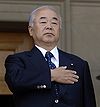
Fumio Kyuma January 9, 2007 July 4, 2007 Shinzō Abe 2 
Yuriko Koike July 4, 2007 August 27, 2007 Shinzō Abe 3 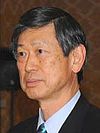
Masahiko Kōmura August 27, 2007 September 26, 2007 Shinzō Abe 4 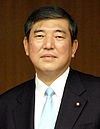
Shigeru Ishiba September 26, 2007 August 2, 2008 Yasuo Fukuda 5 
Yoshimasa Hayashi August 2, 2008 September 24, 2008 Yasuo Fukuda 6 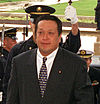
Yasukazu Hamada September 24, 2008 September 16, 2009 Taro Aso 7 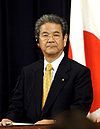
Toshimi Kitazawa September 16, 2009 September 2, 2011 Yukio Hatoyama
8 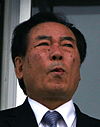
Yasuo Ichikawa September 2, 2011 present Yoshihiko Noda References
- “Library of Congress Country Studies”. JAPAN, The Defense Agency. [1]. Retrieved 18 July 2010.
Zhongguo, T. (27 December 2006) LexusNexis Academic, Japan’s upgrade of Defense Agency paves way to military power – HK-based agency. Retrieved 16 July 2010. “Library of Congress Country Studies”. JAPAN, The Defense Industry. [2]. Retrieved 18 July 2010. Chinadaily.com.cn (10 January 2007) LexusNexus Academic, Defense Agency upgraded to Ministry. Retrieved 16 July 2010.
Japanese government ministries and agencies 
 Cabinet Office (Imperial Household Agency · Fair Trade Commission · National Public Safety Commission and National Police Agency · Financial Services Agency · Consumer Affairs Agency)Internal Affairs and Communications (List) · Justice (List) · Foreign Affairs (List) · Finance (List) · Education, Culture, Sports, Science and Technology (List) · Health, Labour and Welfare (List) · Agriculture, Forestry and Fisheries (List) · Economy, Trade and Industry (List) · Land, Infrastructure, Transport and Tourism (List) · Environment (List) · Defense (List)Categories:
Cabinet Office (Imperial Household Agency · Fair Trade Commission · National Public Safety Commission and National Police Agency · Financial Services Agency · Consumer Affairs Agency)Internal Affairs and Communications (List) · Justice (List) · Foreign Affairs (List) · Finance (List) · Education, Culture, Sports, Science and Technology (List) · Health, Labour and Welfare (List) · Agriculture, Forestry and Fisheries (List) · Economy, Trade and Industry (List) · Land, Infrastructure, Transport and Tourism (List) · Environment (List) · Defense (List)Categories:- Japanese government stubs
- Japanese defense ministers
Wikimedia Foundation. 2010.

